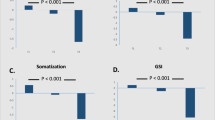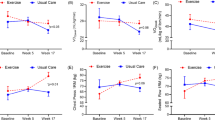Abstract
Background:
Previous research has shown exercise to be an effective method to mitigate many adverse treatment-related effects of androgen suppression therapy (AST) but the potential impact of exercise on sexual activity remains unknown. The purpose of this investigation was to report the effect of a 12-week exercise program on sexual activity in prostate cancer patients undergoing AST.
Methods:
Fifty-seven prostate cancer patients undergoing AST were randomly assigned to an exercise program (resistance and aerobic modes; n=29) or usual care control (n=28). Sexual activity was assessed by the European Organization for Research and Treatment of Cancer prostate cancer-specific quality of life questionnaire (QLQ-PR25).
Results:
QLQ-PR25 data were log transformed and analysis of covariance was used to compare sexual activity between groups following the intervention adjusted for baseline activity. No differences in sexual activity were observed between the exercise and control groups before the intervention. There was a significant (P=0.045) adjusted group difference in sexual activity following the 12-week intervention. Patients undergoing usual care decreased sexual activity while patients in the exercise program maintained their level of sexual activity. At baseline, 20.6 and 22.2% of participants in the exercise and control groups reported a major interest in sex (that is, high libido). Following the intervention, the exercise group had a significantly higher percentage of participants reporting a major interest in sex (exercise=17.2% vs control=0%; P=0.024).
Conclusions:
Participation in a short-term exercise program resulted in the maintenance of sexual activity in prostate cancer patients undergoing AST.
This is a preview of subscription content, access via your institution
Access options
Subscribe to this journal
Receive 4 print issues and online access
$259.00 per year
only $64.75 per issue
Buy this article
- Purchase on Springer Link
- Instant access to full article PDF
Prices may be subject to local taxes which are calculated during checkout



Similar content being viewed by others
References
Spry NA, Kristjanson L, Hooton B, Hayden L, Neerhut G, Gurney H et al. Adverse effects to quality of life arising from treatment can recover with intermittent androgen suppression in men with prostate cancer. Eur J Cancer 2006; 42: 1083–1092.
Fitch MI, Johnson B, Gray R, Franssen E . Survivors' perspectives on the impact of prostate cancer: implications for oncology nurses. Can Oncol Nurs J 1999; 9: 23–34.
Reese JB . Coping with sexual concerns after cancer. Curr Opin Oncol 2011; 23: 313–321.
Bacon CG, Mittleman MA, Kawachi I, Giovannucci E, Glasser DB, Rimm EB . Sexual function in men older than 50 years of age: results from the health professionals follow-up study. Ann Intern Med 2003; 139: 161–168.
Le JD, Cooperberg MR, Sadetsky N, Hittelman AB, Meng MV, Cowan JE et al. Changes in specific domains of sexual function and sexual bother after radical prostatectomy. BJU Int 2010; 106: 1022–1029.
van den Bergh RC, Korfage IJ, Roobol MJ, Bangma CH, de Koning HJ, Steyerberg EW et al. Sexual function with localized prostate cancer: active surveillance vs. radical therapy. BJU Int 2012; 110: 1032–1039.
Siegel T, Moul JW, Spevak M, Alvord WG, Costabile RA . The development of erectile dysfunction in men treated for prostate cancer. J Urol 2001; 165: 430–435.
Sanda MG, Dunn RL, Michalski J, Sandler HM, Northouse L, Hembroff L et al. Quality of life and satisfaction with outcome among prostate-cancer survivors. N Engl J Med 2008; 358: 1250–1261.
Ng E, Woo HH, Turner S, Leong E, Jackson M, Spry N . The influence of testosterone suppression and recovery on sexual function in men with prostate cancer: observations from a prospective study in men undergoing intermittent androgen suppression. J Urol 2012; 187: 2162–2167.
Kaufman JM, Vermeulen A . The decline of androgen levels in elderly men and its clinical and therapeutic implications. Endocr Rev 2005; 26: 833–876.
Sadovsky R, Basson R, Krychman M, Morales AM, Schover L, Wang R et al. Cancer and sexual problems. J Sex Med 2010; 7 (1 Pt 2): 349–373.
Delamater J . Sexual expression in later life: a review and synthesis. J Sex Res 2012; 49: 125–141.
Galvao DA, Taaffe DR, Spry N, Newton RU . Physical activity and genitourinary cancer survivorship. Recent Results Cancer Res 2011; 186: 217–236.
Schmitz KH, Courneya KS, Matthews C, Demark-Wahnefried W, Galvao DA, Pinto BM et al. American College of Sports Medicine roundtable on exercise guidelines for cancer survivors. Med Sci Sports Exerc 2010; 42: 1409–1426.
Galvao DA, Taaffe DR, Spry N, Joseph D, Newton RU . Combined resistance and aerobic exercise program reverses muscle loss in men undergoing androgen suppression therapy for prostate cancer without bone metastases: a randomized controlled trial. J Clin Oncol 2010; 28: 340–347.
Galvao DA, Taaffe DR, Spry N, Newton RU . Exercise can prevent and even reverse adverse effects of androgen suppression treatment in men with prostate cancer. Prostate Cancer Prostatic Dis 2007; 10: 340–346.
Segal RJ, Reid RD, Courneya KS, Malone SC, Parliament MB, Scott CG et al. Resistance exercise in men receiving androgen deprivation therapy for prostate cancer. J Clin Oncol 2003; 21: 1653–1659.
Segal RJ, Reid RD, Courneya KS, Sigal RJ, Kenny GP, Prud’Homme DG et al. Randomized controlled trial of resistance or aerobic exercise in men receiving radiation therapy for prostate cancer. J Clin Oncol 2009; 27: 344–351.
Derby CA, Mohr BA, Goldstein I, Feldman HA, Johannes CB, McKinlay JB . Modifiable risk factors and erectile dysfunction: can lifestyle changes modify risk? Urology 2000; 56: 302–306.
Nicolosi A, Moreira ED, Shirai M, Bin Mohd Tambi MI, Glasser DB . Epidemiology of erectile dysfunction in four countries: cross-national study of the prevalence and correlates of erectile dysfunction. Urology 2003; 61: 201–206.
Pinnock CB, Stapleton AM, Marshall VR . Erectile dysfunction in the community: a prevalence study. Med J Aust 1999; 171: 353–357.
Hsiao W, Shrewsberry AB, Moses KA, Johnson TV, Cai AW, Stuhldreher P et al. Exercise is associated with better erectile function in men under 40 as evaluated by the International Index of Erectile Function. J Sex Med 2012; 9: 524–530.
White JR, Case DA, McWhirter D, Mattison AM . Enhanced sexual behavior in exercising men. Arch Sex Behav 1990; 19: 193–209.
Dahn JR, Penedo FJ, Molton I, Lopez L, Schneiderman N, Antoni MH . Physical activity and sexual functioning after radiotherapy for prostate cancer: beneficial effects for patients undergoing external beam radiotherapy. Urology 2005; 65: 953–958.
Esposito K, Giugliano F, Di Palo C, Giugliano G, Marfella R, D’Andrea F et al. Effect of lifestyle changes on erectile dysfunction in obese men: a randomized controlled trial. JAMA 2004; 291: 2978–2984.
Borg G . Borg’s Perceived Exertion and Pain Scales. Human Kinetics: Champaign, IL, 1998, 104 pp.
van Andel G, Bottomley A, Fossa SD, Efficace F, Coens C, Guerif S et al. An international field study of the EORTC QLQ-PR25: a questionnaire for assessing the health-related quality of life of patients with prostate cancer. Eur J Cancer 2008; 44: 2418–2424.
Ware JE, Sherbourne CD . The MOS 36-item short-form health survey (SF-36). I. Conceptual framework and item selection. Med Care 1992; 30: 473–483.
Miles CL, Candy B, Jones L, Williams R, Tookman A, King M . Interventions for sexual dysfunction following treatments for cancer. Cochrane Database Syst Rev 2007; 17, CD005540.
Acknowledgements
We thank the Cancer Council of Western Australia for their financial support in running the study. PC thanks the Cancer Council of Western Australia for their support of her position through the postdoctoral research fellowship. DAG is funded by a Movember New Directions Development Award obtained through Prostate Cancer Foundation of Australia’s Research Program. This research was supported by funding from the Cancer Council of Western Australia. Clinical trial registry: resistance and aerobic exercise for reducing treatment side effects in men receiving androgen deprivation therapy for prostate cancer; ACTRN12607000263493; http://www.anzctr.org.au/trialSearch.aspx.
Author information
Authors and Affiliations
Corresponding author
Ethics declarations
Competing interests
The authors declare no conflict of interest.
Rights and permissions
About this article
Cite this article
Cormie, P., Newton, R., Taaffe, D. et al. Exercise maintains sexual activity in men undergoing androgen suppression for prostate cancer: a randomized controlled trial. Prostate Cancer Prostatic Dis 16, 170–175 (2013). https://doi.org/10.1038/pcan.2012.52
Received:
Revised:
Accepted:
Published:
Issue Date:
DOI: https://doi.org/10.1038/pcan.2012.52
Keywords
This article is cited by
-
Hybrid delivery of cluster-set resistance training for individuals previously treated for lung cancer: the results of a single-arm feasibility trial
Pilot and Feasibility Studies (2023)
-
A holistic approach to prostate cancer treatment: natural products as enhancers to a medically minded approach
Medical Oncology (2023)
-
Study protocol: investigating the feasibility of a hybrid delivery of home-based cluster set resistance training for individuals previously treated for lung cancer
Pilot and Feasibility Studies (2022)
-
Factors associated with various strategies for maintaining sexual activity after prostate cancer treatment
International Journal of Impotence Research (2022)
-
The effectiveness of lifestyle interventions to reduce side effects of androgen deprivation therapy for men with prostate cancer: a systematic review
Quality of Life Research (2020)



